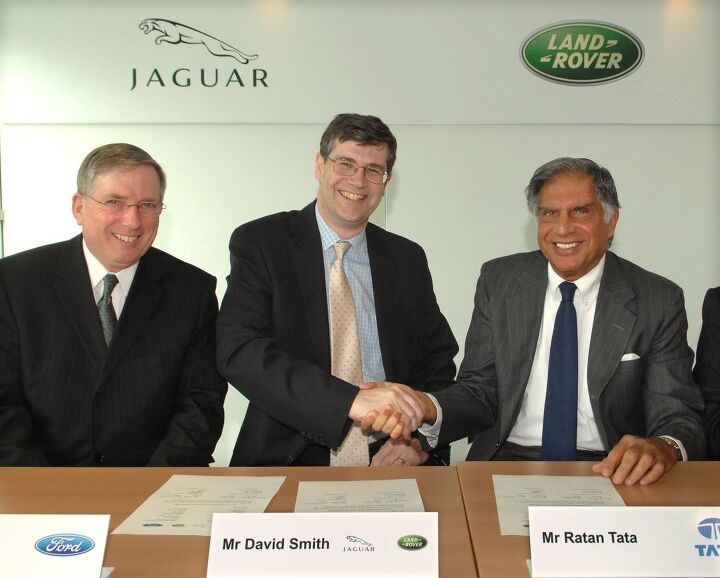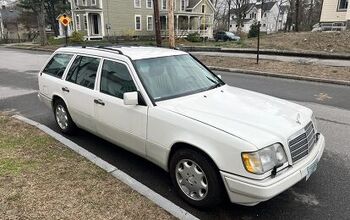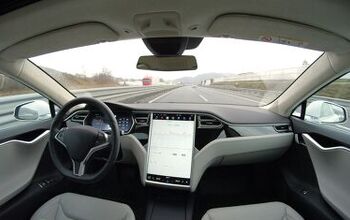Tata Defends JLR Acquisition

Ford were mighty relieved when it managed to off-load it’s British marques, Jaguar and Land Rover, to Tata. Now after 1 year and 9 months of ownership, causing the normally profitable Tata Motors to fall into a £41 million pound loss and falling sales, how do you think Tata are feeling about the purchase of JLR? Sad? Depressed? Suicidal? According to steelguru.com, Ratan Tata is surprisingly optimistic.
If we assume that the global meltdown is a phenomenon that will be over in the near term, I think we will look back and say that these are very strategic and worthwhile acquisitions. There were many questions raised regarding whether these two large acquisitions Corus and JLR are worthwhile and whether the prices were right in terms of being at the top of the market, virtually. My view on that is that if you want to buy a house and that house is of a particular value, then it may not be there if you wait
I hate to break it to him, Jaguar Land Rover wasn’t a house in Belgravia, but a flat in Moss Side. But despite the toxicity of Jaguar Land Rover which is apparent to everyone except Ratan Tata, he still carried on optimistically saying that buying the company gave Tata “international brands” which would have taken years and billions of dollars to establish. Casually, omitting that Volvo, was also up for grabs, too. He then, laid out his plans for the marques in India.
“We have one retail outlet in the country and it is just imports against orders. It will never be the same until we look at another phase where there would be assembly in India, which in turn will depend upon the interest level and the ability of JLR to make that commitment to invest in India.”. The article finishes with this quote “I think JLR would at present moment continue to just look at importing to India and look at improving and securing its position in the territories in which it is strong.”
Was that a thinly veiled threat to management in the UK to pull their socks up? I don’t doubt that Tata Motors have a long term view of Jaguar and I believe their sincerity to restore the brands to their former glories. However, I wonder whether Tata simply do not grasp the monumental task in front of them. Maybe this bravado is for show? I just don’t want my favourite car company to be consigned to the history of books along side Packard, Studebaker, Pontiac, Saturn and Oldsmobile.

More by Cammy Corrigan
Latest Car Reviews
Read moreLatest Product Reviews
Read moreRecent Comments
- W Conrad I'm not afraid of them, but they aren't needed for everyone or everywhere. Long haul and highway driving sure, but in the city, nope.
- Jalop1991 In a manner similar to PHEV being the correct answer, I declare RPVs to be the correct answer here.We're doing it with certain aircraft; why not with cars on the ground, using hardware and tools like Telsa's "FSD" or GM's "SuperCruise" as the base?Take the local Uber driver out of the car, and put him in a professional centralized environment from where he drives me around. The system and the individual car can have awareness as well as gates, but he's responsible for the driving.Put the tech into my car, and let me buy it as needed. I need someone else to drive me home; hit the button and voila, I've hired a driver for the moment. I don't want to drive 11 hours to my vacation spot; hire the remote pilot for that. When I get there, I have my car and he's still at his normal location, piloting cars for other people.The system would allow for driver rest period, like what's required for truckers, so I might end up with multiple people driving me to the coast. I don't care. And they don't have to be physically with me, therefore they can be way cheaper.Charge taxi-type per-mile rates. For long drives, offer per-trip rates. Offer subscriptions, including miles/hours. Whatever.(And for grins, dress the remote pilots all as Johnnie.)Start this out with big rigs. Take the trucker away from the long haul driving, and let him be there for emergencies and the short haul parts of the trip.And in a manner similar to PHEVs being discredited, I fully expect to be razzed for this brilliant idea (not unlike how Alan Kay wasn't recognized until many many years later for his Dynabook vision).
- B-BodyBuick84 Not afraid of AV's as I highly doubt they will ever be %100 viable for our roads. Stop-and-go downtown city or rush hour highway traffic? I can see that, but otherwise there's simply too many variables. Bad weather conditions, faded road lines or markings, reflective surfaces with glare, etc. There's also the issue of cultural norms. About a decade ago there was actually an online test called 'The Morality Machine' one could do online where you were in control of an AV and choose what action to take when a crash was inevitable. I think something like 2.5 million people across the world participated? For example, do you hit and most likely kill the elderly couple strolling across the crosswalk or crash the vehicle into a cement barrier and almost certainly cause the death of the vehicle occupants? What if it's a parent and child? In N. America 98% of people choose to hit the elderly couple and save themselves while in Asia, the exact opposite happened where 98% choose to hit the parent and child. Why? Cultural differences. Asia puts a lot of emphasis on respecting their elderly while N. America has a culture of 'save/ protect the children'. Are these AV's going to respect that culture? Is a VW Jetta or Buick Envision AV going to have different programming depending on whether it's sold in Canada or Taiwan? how's that going to effect legislation and legal battles when a crash inevitibly does happen? These are the true barriers to mass AV adoption, and in the 10 years since that test came out, there has been zero answers or progress on this matter. So no, I'm not afraid of AV's simply because with the exception of a few specific situations, most avenues are going to prove to be a dead-end for automakers.
- Mike Bradley Autonomous cars were developed in Silicon Valley. For new products there, the standard business plan is to put a barely-functioning product on the market right away and wait for the early-adopter customers to find the flaws. That's exactly what's happened. Detroit's plan is pretty much the opposite, but Detroit isn't developing this product. That's why dealers, for instance, haven't been trained in the cars.
- Dartman https://apnews.com/article/artificial-intelligence-fighter-jets-air-force-6a1100c96a73ca9b7f41cbd6a2753fdaAutonomous/Ai is here now. The question is implementation and acceptance.


































Comments
Join the conversation
Whilst I think Tata could have got JLR for less money had the recession hit earlier. I do think that both brands are very smart long term investments. For a start it's easy to overlook a few key facts. Firstly JLR were making solid profits before the recession hit (that's why TATA paid an arm and a leg for it in the first place). Secondly Jaguar is very much a brand on the rise. The XF has been a sales hit and the XJ is receiving a lot of advanced orders. Then there is Land Rover. They have the baby hybrid Range Rover about 1 year away from launch and in Western Europe that will be a monster hit, just like the RR Sport was when that was launched (RR Sport increased Land Rover sales by over 40% at the time). Land Rover sales have been hit hard by the recession but now that's coming to an end their sales are rising as fast as they were dropping. JLR will get back to profit very soon. And for those of you who think they should have bought Volvo, well why? Their cars are old fashioned and their margins/ sales figures are awfull. At least JLR operates with high profit margins and it has a much better range. Also has JLR always been a basket case? How often did Land Rover ever lose money under BMW and Rover? (they were called the Jewel in the crown for a very good reason). As I recall their profits have only ever been dragged down by Jaguar and even that's on the mend. And don't forget before Ford bought Jaguar the XJ was a best seller. Yes Ford blew a fortune on JLR. Which was mostly spent fixing Jaguar's run down factories. But now Ford have spent the money, TATA will benefit.
The photo says it all. The man from Jaguar can't stop laughing. The man from Ford looks extremely relieved. They both look like they have just had a huge burden lifted from their shoulders. All that the Tata guy can manage is a phony photo opportunity smile.